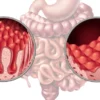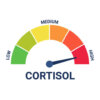
IBS is often diagnosed as a life-long condition and patients are told to manage symptoms by working out which foods are triggers and avoiding them.
However, more research is emerging around the benefits of specific types of supplements, not only for managing symptoms but also for addressing the actual underlying cause.
This article will explore this in more detail and help guide you through the best supplements for IBS.
How Supplements Can Help with IBS
Supplements can be used and prescribed in a number of ways but for the most part, they will fall into one of two categories.
These are:
1. Symptom management supplements
2. Therapeutic supplements
It’s important to understand the differences between these 2 categories as this will help with how they’re selected and used.
Symptom management supplements are used to help improve symptoms in the short term as they’re being taken. For example, digestive enzymes can extremely help for IBS to improve symptoms such as bloating. However, once the enzymes are discontinued it’s very likely that symptoms will return to the same level. Therefore, it can be helpful to see symptom management supplements as a way to improve symptoms in the short term but these would need to be taken long-term to see the continued benefit.
On the other hand, therapeutic supplements are used to address the underlying cause of the symptoms. These can be considered as IBS supplements that are used for a set period of time (often 4-8 weeks) with the aim of addressing the root cause so they’re no longer needed.
Symptom Management Supplements Treatment Supplements
· Digestive enzymes
· Laxatives
· Simethicone
· Buscopan
· Probiotic · Prebiotics · Peppermint oil · Butyric acid · Colostrum · Herbal antimicrobials · L-glutamine
Best Supplements for IBS
In this next section, I will go into more detail into these 2 sections discussing the options and strategies for using these products.
Symptom Management Supplements
The supplements that are used to approach symptom management include:
Digestive enzymes
Digestive enzymes can be used in various forms. For this with issues with digesting fats, a bile acid supplement can be an effective digestive aid. In others with carbohydrate intolerances (such as issues with digesting FODMAPs), a general digestive enzyme can be helpful.
Some products contain a specific enzyme called alpha-galactosidase which can be very helpful in addressing issues with FODMAPs such as beans, lentils, onion and garlic.
This is also true for those with lactose issues where a lactase enzyme supplement can be taken along with lactose-containing foods.
Laxatives
Bowel movements can be supported and encouraged with regular use of laxatives or stool softeners. These can either support muscle contractions in the bowel via a stimulatory effect or introduce more fluid to help soften the stool.
While many of these may need to be taken ongoingly, due to their beneficial prebiotic content, lactulose can also be used to support and rebalance the gut microbiome. However, in some lactulose may need to be taken with caution as it can increase gas and bloating.
Magnesium
Magnesium is also used as a way to support bowel movements. It is often better tolerated than other laxatives such as lactulose or sodium picosulfate. This is often because the dose can be more finely adjusted.
While most forms of magnesium, if taken in high enough amounts, will help, magnesium oxide is the form that is often suggested to support bowel movements.
Simethicone
Simethicone is the active ingredient in products such as Wind-eze and can be helpful in managing gas and bloating-related issues. It does this by breaking smaller bubbles of gas or wind into a large bubble which can make it easier to pass and eliminate.
Buscopan
This is an over-the-counter medication that can help reduce cramping but calm overactive muscle contractions in the gut. It can also help with period pain and cramping via the same mechanisms.
While it can calm these symptoms of IBS, it does not cure them.
Therapeutic Supplements
The supplements that are used as a therapeutic approach include the following:
Probiotics
Rather than probiotics simply adding more bacteria to the gut, these are technically transient organisms. This means they pass through the gut but do not live there.
However, as they pass through they interact with the gut lining supporting a beneficial response from the body. This can include reducing inflammation, calming muscle contractions and rebalancing the gut microbiome.
Specific strains of probiotic bacteria are researched to help to address specific symptoms. However, multi-strain probiotics can also be equally beneficial.
2 of the most well-researched strains for IBS are:
· Lactobacillus Rhamnosus GG
· Lactobacillus Plantarum 299V
Prebiotics
Whereas probiotics support the gut lining which in turn supports the microbiome, prebiotics work to feed very specific strains of bacteria. These are the bacteria already in the gut so it may be helpful to view these as a type of fertiliser for the gut microbiome.
As with probiotics, these can be selected based on symptoms but microbiome test results may also offer insight into which strains need to be fed.
Prebiotics include:
· PHGG
· GOS
· FOS/Inulin
· Lactulose
Peppermint oil
Peppermint oil has several beneficial properties, some of which can act in the short term to calm symptoms while others can address underlying factors as a treatment.
When using it as a treatment, taking it as a course of treatment may be the most important factor, rather than just taking it as or when symptoms appear.
Some of the beneficial properties of peppermint oil include:
· Calming nerve sensitivity to reduce pain
· Reducing inflammation
· Antimicrobial activity to rebalance the gut microbiome
Butyric acid
As a post-biotic, butyric acid can help address many of the underlying factors that lead to the symptoms of IBS.
While not researched to the same degree as other approaches such as probiotics, it can help the gut by:
· supporting the regeneration of the gut lining
· helping to reduce inflammation
· calming an overactive immune response in the gut
Colostrum
As with butyric acid, colostrum does not have the same level of clinical research behind it as probiotics do. However, studies have found it can help address the underlying issues often seen in IBS.
From a clinical practice perspective, I have found this to be a helpful tool for many IBS patients. In particular, the ones who have not responded to first-line approaches such as probiotics.
Herbal antimicrobials
Changes in the gut microbiome can be a key cause of gut issues. This can be in the form of general imbalances (termed dysbiosis) or bacterial overgrowth (termed SIBO).
These herbs include:
· garlic
· oregano
· neem
· berberine
From a medical perspective, SIBO is often treated using the antibiotic Rifaximin. However, studies have found herbal approaches to be as effective.
L-glutamine
Glutamine is considered a conditionally essential amino acid. This means that it’s required in higher amounts under certain conditions, one of which is the repair of the gut lining.
One of the most well-researched applications for glutamine is IBS with diarrhoea that follows a gastric infection or case of food poisoning.
Choosing the Right Supplement for Your IBS Type
The subtype of IBS being experienced can help to create a protocol to address symptoms and treat the possible underlying cause.
IBS-C (Constipation-predominant)
For constipation-predominant IBS, a supplement protocol would likely include a form of gentle stool softener. This can help to not only improve bowel movements but reduce the pain, gas and general discomfort that often accompany it.
It can also be worth considering the presence of methane SIBO which can be tested for via a SIBO breath test and then treated with herbal antimicrobials such as garlic but also probiotics such as L Reuteri.
The prebiotic PHGG is also considered, not only as it can help to normalise bowel patterns but can also improve how well antimicrobial treatments work.
IBS-D (Diarrhoea-predominant)
While considering the underlying cause is also important, certain supplements can help with treating IBS-D.
Based on symptoms alone, key probiotics such as Rhamnosus GG and Saccharomyces Boulardi can be considered to address diarrhoea. If symptoms were triggered by an infection then l-glutamine may also be a key consideration.
It’s also possible for changes to the gut microbiome to lead to food reactions or malabsorption of certain sugar to carbohydrates.
While probiotics may go some way to address this, herbal antimicrobials may also be considered. These will include oregano and berberine.
Possible Side Effects and Precautions
Even with natural approaches, it is important to consider reactions and side effects of supplements. These often include an increase in digestive symptoms but may include symptoms such as a headache or in some cases a skin reaction.
Interactions with medications
While supplements like probiotics do not react with any medications, it’s important to check contraindications if medications are being taken. In particular, herbal medications and supplements are the most likely to interact with medications such as blood pressure medications or anti-depressants.
This is a reason why working with a gut-health specialist can help to ensure the safe prescription of supplements alongside pharmaceutical medications.
When to consult a doctor
Speaking with a doctor can be an important part of the process, in particular, if certain symptoms are present. These are described as red flag symptoms which may indicate something more serious is taking place.
These are often examined during initial digestive health reviews by a GP or gastro.
These include:
· Sudden onset of symptoms in someone who is more than 50 years of age
· Unexplained weight loss
· Anaemia (low iron)
· Evidence of gastrointestinal bleeding
Other Natural Approaches for IBS Management
Alongside supplements, other key strategies include:
· Dietary adjustments and modifications
· Gut-brain support
· Acupuncture
· Meditation
Conclusion
Treatment for IBS can consist of both symptom management and therapeutic interventions, the aim of which is for the patient not to have to rely on long-term symptom management strategies.
To guide you through supplements as well as other factors such as diet, please get in contact for a gut health assessment.
Last Updated
Posted on 17/04/2025 by Martin Cohen
References
NIH — National Center for Complementary and Integrative Health — Probiotics: What You Need To Know
Cleveland Clinic — L-Glutamine: Benefits, Dosage and Side Effects
Johns Hopkins Medicine — Probiotics for IBS: Can They Help?
National Library of Medicine — Butyrate and the Intestinal Barrier
Mayo Clinic — Irritable Bowel Syndrome Treatment Overview
British Dietetic Association (BDA) — Probiotics and Prebiotics: What’s the Difference?
National Institutes of Health — MedlinePlus — Peppermint Oil
BMJ Journals — Gut — The role of prebiotics in gut health






